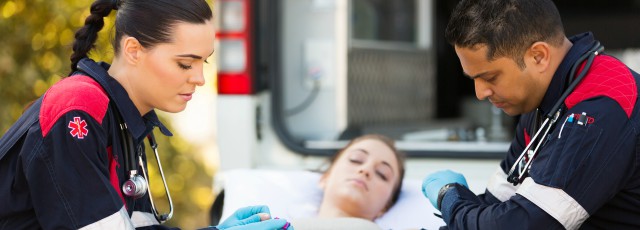Paramedic interview questions and answers
This Paramedic interview profile brings together a snapshot of what to look for in candidates with a balanced sample of suitable interview questions.

10 good paramedic interview questions
- Why did you decide to be a paramedic?
- Describe the most challenging call you ever received as a paramedic.
- How would you handle a multi-agency call?
- What have you recently done to improve or update your skills as a paramedic?
- What kinds of environments have you worked in as a paramedic?
- How would you remove a heavy patient from a difficult or dangerous situation?
- In as much detail as possible, describe the process of administering morphine through an IV. What would you do differently if the patient was a child?
- In as much detail as possible, describe the process for treating broken bones.
- What are some ways to treat drug overdose?
- How would you treat a hypothermic patient?
Here are 10 essential interview questions and sample answers to help identify the best candidates for this role.
1. Why did you decide to be a paramedic?
This question helps to understand the motivation behind choosing this career path. It can reveal whether the candidate is genuinely passionate about the job or simply views it as a stepping stone.
Sample answer:
“I decided to become a paramedic because I’ve always been drawn to roles where I can make a direct impact on people’s lives. The fast-paced, unpredictable nature of the job keeps me engaged, and the opportunity to save lives is incredibly rewarding.”
2. Describe the most challenging call you ever received as a paramedic.
This question aims to gauge the candidate’s experience and how they handle high-pressure situations.
Sample answer:
“The most challenging call I ever received was a multi-vehicle accident with multiple casualties. It required quick triage, effective communication with other agencies, and precise medical intervention. Despite the chaos, we managed to stabilize all patients for transport.”
3. How would you handle a multi-agency call?
This question assesses the candidate’s ability to collaborate and communicate effectively with different agencies during emergencies.
Sample answer:
“In a multi-agency call, clear communication and coordination are key. I would make sure to establish a unified command and work closely with other agencies to ensure that resources are used effectively and everyone is on the same page.”
4. What have you recently done to improve or update your skills as a paramedic?
This question evaluates the candidate’s commitment to professional development.
Sample answer:
“I recently completed an Advanced Cardiac Life Support (ACLS) certification to update my skills. I also regularly attend workshops and webinars to stay current with the latest medical protocols.”
5. What kinds of environments have you worked in as a paramedic?
This question helps to understand the candidate’s adaptability and experience in different settings.
Sample answer:
“I’ve worked in both urban and rural settings, which has given me a well-rounded skill set. Each environment has its own challenges, but my core approach to patient care remains the same.”
6. How would you remove a heavy patient from a difficult or dangerous situation?
This question tests the candidate’s problem-solving skills and physical capabilities.
Sample answer:
“I would assess the situation carefully and use mechanical advantages like a stair chair or a scoop stretcher, depending on the circumstances. Safety for both the patient and the team is my top priority.”
7. In as much detail as possible, describe the process of administering morphine through an IV. What would you do differently if the patient was a child?
This question checks the candidate’s technical knowledge and attention to detail.
Sample answer:
“After confirming the prescription and dosage, I would prepare a sterile field and insert an IV catheter into a suitable vein. I would then administer the morphine slowly while monitoring the patient’s vital signs. For a child, I would adjust the dosage based on weight and closely monitor for any adverse reactions.”
8. In as much detail as possible, describe the process for treating broken bones.
This question evaluates the candidate’s medical knowledge and procedural skills.
Sample answer:
“First, I would assess the severity of the break and immobilize the limb using splints or other available materials. I would then administer pain relief and prepare the patient for transport, ensuring that the broken bone is stabilized to prevent further injury.”
9. What are some ways to treat drug overdose?
This question assesses the candidate’s knowledge of emergency medical procedures related to drug overdose.
Sample answer:
“Immediate assessment and supportive care are crucial. Depending on the substance involved, I might administer medications like Naloxone for opioid overdoses. I would also monitor vital signs and prepare the patient for rapid transport to a medical facility.”
10. How would you treat a hypothermic patient?
This question tests the candidate’s understanding of treating temperature-related emergencies.
Sample answer:
“I would start by moving the patient to a warmer environment if possible. I would then use blankets and warm fluids to gradually raise the patient’s body temperature while monitoring vital signs.”
What does a good paramedic candidate look like?
A good paramedic candidate is not only technically proficient but also emotionally resilient. They should be able to think on their feet, communicate effectively, and remain calm under pressure. A strong commitment to continuous learning and adaptability to different working environments are also key traits.
Red flags
Be cautious of candidates who lack empathy, have poor communication skills, or seem indifferent to professional development. Inability to handle stress or make quick decisions can also be a major red flag.
Paramedic Interview Questions
Some basic qualifications for Paramedic candidates include EMT certification, completion of a paramedic training course, at least six months of experience working as an EMT, and passing the NREMT (National Registry of Emergency Medical Technicians) exam.
There are different types of paramedics, such as EMTs, flight medics, and firefighter medics. For best results, it’s important to tailor questions to the exact working environment. If the questions below don’t cover a skill that’s critical for the role, be sure to add some questions of your own.
The best interview questions for this type of position are open-ended and situational. Use these questions to evaluate your candidates’ paramedicine experience. Great paramedics can stay calm under pressure and go the extra mile to ensure the wellbeing of their patients. Questions such as “Describe a time you acted professionally, despite your personal feelings” will help you see how they cope with the stress of the job.
Let’s summarize some of the questions and add a few more divided into specific types.
Operational and Situational questions
- Why did you decide to be a paramedic?
- Describe the most challenging call you ever received as a paramedic.
- How would you handle a multi-agency call?
- What have you recently done to improve or update your skills as a paramedic?
- What kinds of environments have you worked in as a paramedic?
- How would you remove a heavy patient from a difficult or dangerous situation?
- In as much detail as possible, describe the process of administering morphine through an IV. What would you do differently if the patient was a child?
- In as much detail as possible, describe the process for treating broken bones.
- What are some ways to treat drug overdose?
- What are some ways to treat burns?
- How would you treat a hypothermic patient?
- How would you handle an epileptic seizure?
- As a paramedic, what kinds of life support medication do you usually have with you?
- Have you ever responded to a crime scene as a paramedic? What did you do?
- Describe a time you had to act professionally, despite your personal feelings.
- Describe a time you did the right thing, even though it was more difficult for you.
- This job can be stressful. What do you do to stay calm?
